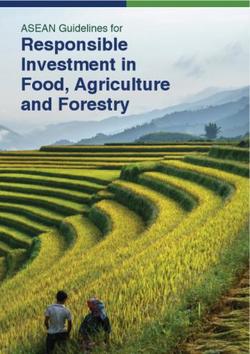ASEAN guidelines for responsible investment in food, agriculture and forestry
Key Messages
- Responsible investment in food, agriculture, and forestry requires a clear policy and regulatory framework, both at the national and ASEAN-wide levels. Policy-makers, the private sector, civil society and other stakeholders all have valuable roles to play in this respect.
- Done correctly, investment can have a critical role in supporting food and nutrition security, creating jobs, tackling poverty, and achieving other important development outcomes for the region and its individual member states. Investment can also come with significant risks to local communities and indigenous peoples, if not done responsibly.
The ASEAN Guidelines on Promoting Responsible Investment in Food, Agriculture and Forestry were adopted by ASEAN Ministers on Agriculture and Forestry (AMAF) in October 2018 and were developed in response to a decision by that same group the year prior.
The guidelines have as their main objective the promotion of responsible regional investment in food, agriculture and forestry that ensures economic development, while also incorporating and reflecting the diverse circumstances of different ASEAN member states. Ensuring responsible investment in these sectors will be key in meeting the food safety and security needs of the growing population of the Southeast Asian region.
The guidelines are grounded in the Committee on World Security’s Principles for Responsible Agriculture and Food Systems (CFS-RAI). They were developed through a multistakeholder process involving the ASEAN Secretariat, Grow Asia, the International Institute for Sustainable Development, the Swiss Agency for Development Cooperation and a World Bank trust fund.
Guidelines can be download here













